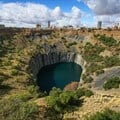Edible oil producer, Willowton Group, is helping re-introduce KwaZulu-Natal (KZN) yellowfish to the Baynespruit as part of an ongoing environmental rehabilitation project. The freshwater fish is common throughout eastern South Africa and is found in most KZN rivers.

The KZN yellowfish is being reintroduced into the Baynespruit River in Pietermaritzburg.
Although not threatened, its numbers have decreased due to various anthropogenic pressures such as increased water usage by growing settlements along the banks of rivers in KZN, deteriorating water quality and the establishment of barriers and dams that stop migration. It is an ideal indicator species for general river health.
Monthly river cleanups
The re-introduction – or inoculation programme – is a strategic part of a broader commitment by Willowton Group to help improve the Baynespruit, which is one of South Africa’s six most polluted rivers. The company has committed to monthly cleanups of a 1km-long stretch of the Baynespruit River between the bridge at New Greytown Road (Bambatha Road) and Manning Avenue bridge in Pietermaritzburg.
To date, six cleanups, which include the removal of refuse and invasive vegetation from the river and its banks, have been conducted.
Willowton Group has been working with stakeholders, including the Dusi Umgeni Conservation Trust (DUCT), as a fellow founder of the Baynespruit Conservancy in 2020 to clean the river and make environmental improvement efforts.
Garyn Rapson, Kirsty Kilner & Carma Rossouw 28 Jun 2022 Coupled with a monitoring programme
The programme has two components – a translocation (re-inoculation) activity where KZN yellowfish numbers will be increased at strategic impacted areas, coupled with a monitoring component assessing the success of the process, as well as real-time water quality monitoring and biomonitoring through the deployment of water quality sensors or probes.
According to Yusuf Raja, environmental specialist and project manager at Arup, “The project will assist in improving the overall aquatic system and benefit water users. It also demonstrates the commitment of the Willowton Group to make a meaningful and sustainable difference within the environment in which they operate.”
The re-inoculation programme and associated independent academic research is being funded by the Willowton Group.































